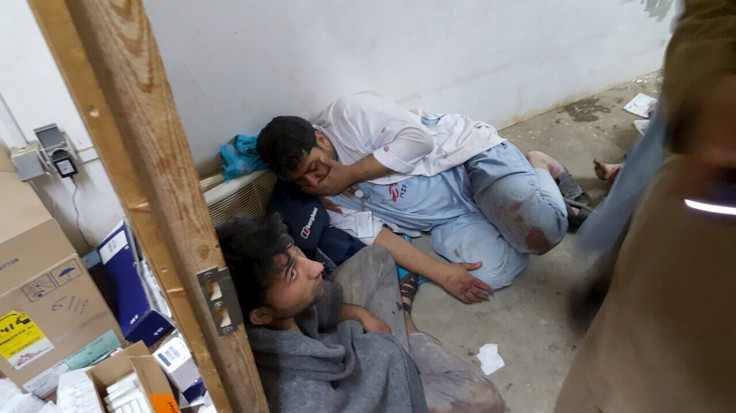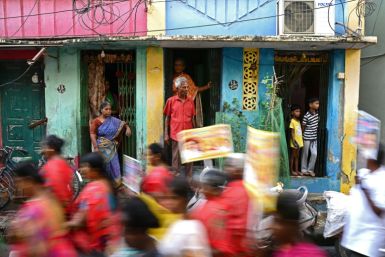Doctors Without Borders Condemns Airstrikes On Afghanistan Hospital; US Defense Secretary Promises Probe

UPDATE 8:40 p.m. EDT: The White House issued a statement late Saturday, expressing condolences for those killed by Saturday's bombing.
On behalf of the American people, I extend my deepest condolences to the medical professionals and other civilians killed and injured in the tragic incident at a Doctors Without Borders hospital in Kunduz. The Department of Defense has launched a full investigation, and we will await the results of that inquiry before making a definitive judgment as to the circumstances of this tragedy. I have asked the Department of Defense to keep me apprised of the investigation and expect a full accounting of the facts and circumstances. Michelle and I offer our thoughts and prayers to all of the civilians affected by this incident, their families, and loved ones. We will continue to work closely with President Ghani, the Afghan government, and our international partners to support the Afghan National Defense and Security forces as they work to secure their country.
UPDATE 5:00 p.m. EDT -- The United Nations joined Doctors Without Borders in condemning the aerial bombing of a hospital in Kunduz, Afghanistan, Saturday. Secretary General Ban Ki-moon called for a "thorough and impartial" investigation into the attack, which killed 12 members of the international humanitarian group's staff and at least seven patients. At least 37 others were injured.
"The secretary general recalls that hospitals and medical personnel are explicitly protected under international humanitarian law," read a statement released Saturday by Ban's spokesman. "[Doctors Without Borders] has been operating the only hospital in Kunduz under extremely trying conditions. The secretary general commends the courageous and dedicated staff of the organization and extends his deepest sympathies to the families of those killed and injured in this attack."
Lajos Zoltan Jecs, a Doctors Without Borders nurse who was in the Kunduz trauma hospital when the facility was struck Saturday morning, described the bombing in a statement released that day. "It was crazy," he said. "We had to organize a mass casualty plan in the office, seeing which doctors were alive and available to help. We did an urgent surgery for one of our doctors. Unfortunately, he died there on the office table. We did our best, but it wasn't enough."
#MSF nurse, Kunduz: "There are no words for how terrible it was. In the ICU, 6 patients were burning in their beds" http://t.co/xCtthf67NQ
— Doctors w/o Borders (@MSF_USA) October 3, 2015
Original story:
Doctors Without Borders, the international humanitarian group, condemned “in the strongest possible terms” the aerial bombing of its hospital in Kunduz, Afghanistan, Saturday. The U.S.-confirmed airstrikes killed 12 members of the organization’s staff and at least seven patients, including three children. It also injured 37 other people.
The attack “constitutes a grave violation of international humanitarian law,” Doctors Without Borders President Meinie Nicolai said in a statement. “We cannot accept that this horrific loss of life will simply be dismissed as ‘collateral damage.’”
Allegedly carried out by international coalition forces and coordinated by the U.S. military, the airstrikes were reportedly conducted during a counterinsurgency effort targeting the Taliban in the northeastern region of Afghanistan. It was the first time since the U.S. began pulling most of its military personnel from the country that American forces played an active role in supporting Afghan troops, the New York Times reported.
#MSF demands full & transparent account from Coalition regarding its aerial bombing #Kunduz http://t.co/nQT3Blt2V1 pic.twitter.com/rgWWPcqH8z
— Doctors w/o Borders (@MSF_USA) October 3, 2015While Doctors Without Borders called for an independent investigation of the attack “to ensure maximum transparency and accountability,” American military leaders promised to provide answers to questions after its own probe, with Defense Secretary Ashton Carter saying Afghanistan and the U.S. had begun a “full investigation into the tragic incident.”
The U.S. military confirmed that the coalition carried out an airstrike at 2:15 a.m. local time that targeted individuals “who were threatening the force.” But “there may have been collateral damage to a nearby medical facility,” the New York Times quoted American officials as saying.
Doctors Without Borders said its trauma hospital in Kunduz had been hit by a series of aerial bombing raids from 2:08 a.m. to 3:15 a.m. local time. The central hospital building -- encompassing emergency rooms, an intensive-care unit and a physiotherapy ward -- was struck repeatedly at about 15-minute intervals, the organization said in its statement.
“The bombs hit and then we heard the plane circle round,” said Heman Nagarathnam, the Doctors Without Borders head of programs in northern Afghanistan. “There was a pause, and then more bombs hit. This happened again and again. When I made it out from the office, the main hospital building was engulfed in flames. Those people that could had moved quickly to the building’s two bunkers to seek safety. But patients who were unable to escape burned to death as they lay in their beds.”
Organization officials said it provided the GPS coordinates of its trauma hospital to coalition and Afghan forces as recently as Sept. 29, to avoid being hit by airstrikes. It’s a routine practice for Doctors Without Borders, said Nicolai, the organization’s president.
“Besides resulting in the deaths of our colleagues and patients, this attack has cut off access to urgent trauma care for the population in Kunduz at a time when its services are most needed,” Nicolai said. “Once again, we call on all warring parties to respect civilians, health facilities, and medical staff, according to international humanitarian law.”
© Copyright IBTimes 2024. All rights reserved.












